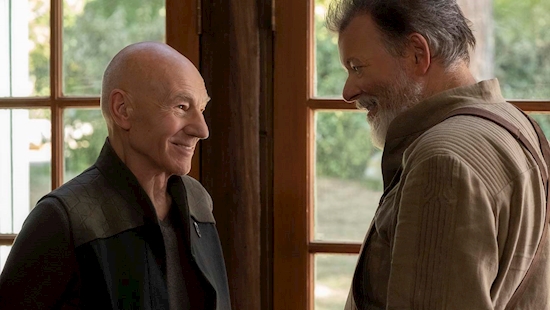How 'Picard' Ended Up with Characters Patrick Stewart Rejected (At First)
"None of it."
That’s what Star Trek: Picard executive producer Akiva Goldsman tells The Hollywood Reporter when asked how much of the CBS All Access show’s original pitch doc survived in the making of the final product.
That story document — which Goldsman helped write with executive producers Alex Kurtzman and Michael Chabon — was quickly turned around 48 hours after the team first met with Patrick Stewart to pitch their take on bringing Captain Picard back to television for the first time in 26 years. While it’s common practice for shows in their early days to undergo narrative changes once stakeholders weigh in, especially talent like Stewart, the writers were pleasantly surprised by the virtual page-one rewrite. In a recent interview promoting the series, Goldsman, Kurtzman, Chabon and executive producer Heather Kadin reveal why the changes made the show even better — especially since they lead to finding a role for a popular Star Trek character that was missing from their first pass.
"Data wasn’t originally involved," Kurtzman explains. "Much of [the story] changed, but the spirit was very much alive in the work. It’s just the plot changed quite a bit."
Data’s (Brent Spiner) absence from the series, or any Next Generation legacy character, was initially due in part to Stewart’s initial vision for the shape Picard should take.
"Patrick, in the beginning, felt like ‘I don’t want this to be a reunion show. I don’t want this to be me and a bunch of legacy cast walking through the door,’ Kadin recalls. That conversation later sparked another with the show’s star once he was officially involved, with the intent being to say 'we think it would be great to have Data — here’s why it’s important to the story.' "
"It was a constant collaboration. A real flow of conversation," Kurtzman adds. He stressed that, even though it took the creatives "a while to land on what the key things were," everyone soon agreed that, when it comes to seeing Picard again, "the first things that come to mind are Data and the Borg."
With the Borg playing a formative role in the character’s life, both on the TV series and in the 1996 feature Star Trek: First Contact, the challenge for both Stewart and the writers was to (pun so intended) avoid going where Picard had gone before with his most lethal enemy.
"Patrick was, originally, really not into doing the Borg," Kurtzman says. "He was insistent — very correctly — on not repeating anything he had previously done The Next Generation when it came to [the Borg]. He said ‘I’ve done that story, I don’t want to do that.’ And we said ‘okay.’"
When Kurtzman and the others started breaking story and thinking about what they wanted to do, based on what Stewart didn’t want to do, they eventually found themselves circling back to the Borg. "We found a new way into telling that story," Kurtzman says. "So we sat Patrick down — because he was a very big part of the writer’s room — and we pitched it to him and he goes ‘That sounds fantastic.’ So, he wasn’t conceptually opposed to the Borg, as much as he was opposed to not playing Locutus again."
What that new storyline is involving the Borg is something the premiere episode only hints at — and Kurtzman, Goldsman, and Chabon didn’t divulge any details. But what’s interesting about the alien race’s role in the new show, Kurtzman says, comes from a place of both the actor and his character wanting to "experience the Borg differently and that’s why the spirit of the Borg story ultimately ended up working."
While the creatives had carte blanche access to other legacy characters (think LaVar Burton’s Geordi La Forge or Michael Dorn’s Klingon Worf), Chabon and Goldsman made sure that was a well they would only go to if it serviced the story and not just fans.
Pushing the characters into new conflicts and drama was a mandate everyone had from the jump, Chabon added. Which is not easy for a franchise with more than five decades of storytelling under its belt.
"From our first meeting that we had … it was very clear that the one thing we had to make sure that we were doing nothing that had been done before. So whatever elements from TNG that we settle on or wanted to use, we had to figure out a way to do so in a new way — that whatever story we end up telling about Jean-Luc Picard resonates with the world how it is today. In the ways fans expect from Star Trek."
Star Trek: Picard is now streaming on CBS All Access.
Source: www.hollywoodreporter.com

